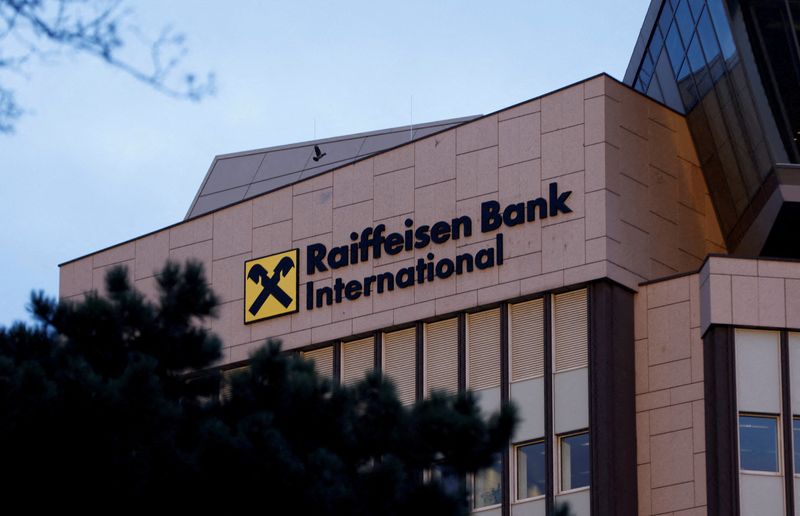LONDON/FRANKFURT (Reuters) -The U.S. Treasury has warned Austria's Raiffeisen Bank International (RBI) that its access to the U.S. financial system could be restricted because of its Russian dealings, according to a person who has seen a letter detailing the threat.
The May 6 letter is the strongest warning yet to the biggest Western bank in Russia and follows months of pressure from Washington, and Europe, as they try to toughen up sanctions against Russia and further squeeze it financially.
RBI this month abandoned a $1.5 billion deal linked with a sanctioned Russian tycoon that the U.S. opposed. But the bank's ties to Russia run much deeper. Restrictions on its access to the dollar system would have potentially deeply damaging consequences.
WHY IS THE U.S. CONCERNED?
After Russia launched its full-scale invasion of Ukraine in February 2022, the U.S. responded with wide-ranging sanctions on Russia and its companies. Many Western companies, including banks, made a rush to exit.
But several Western banks with a big presence in Russia including RBI and Italy's UniCredit have remained. Both have been in Russia since the collapse of the Soviet Union more than three decades ago.
RBI's reluctance to pull back has increasingly frustrated U.S. officials aware that their sanctions have not been as effective as hoped. Sanctions enforcement agency OFAC launched an inquiry into RBI at the start of 2023.
The bank has been delaying plans to leave Russia.
To unlock funds frozen in Russia, RBI had planned to buy a stake in construction group Strabag from a company the Vienna-based group identified as being controlled by Russian tycoon Oleg Deripaska.
The move was opposed by the U.S. Treasury because Deripaska is sanctioned.
After repeated U.S. warnings not to proceed, this month the bank dropped the bid.
The European Central Bank is also stepping up pressure on RBI, and is expected to tell it to reduce business in Russia.
Remaining in Russia has proven very profitable for banks, a disincentive to exit.
WHAT DOES RBI SAY?
An RBI spokesperson said on Wednesday the bank had significantly reduced activities in Russia and was working towards "de-consolidation" of its subsidiary there.
Banks including RBI also say that exiting Russia is a complicated process, and that they cannot just sell up.
For an international bank to spin off local operations, it would require the approval of Russia's central bank, finance ministry and even Russian President Vladimir Putin.
Russian authorities last year made it clear to RBI, which has around 4 million local account holders and 10,000 staff, that they wish it to stay because it enables international payments, one source previously told Reuters.
U.S. sanctions denied Russian banks access to the SWIFT global payment system. That has made lenders like RBI a payment lifeline to hundreds of Russian companies.
RBI has also received support from Austria, where officials have pushed back against pressure on the bank.
Austria and Russia maintain close ties going back decades and Vienna has long acted as a hub for cash from Russia and its former Soviet neighbours.
WHAT COULD THE U.S. DO?
In short, a lot.
The dollar is the cornerstone of international finance and the United States is the world's most powerful regulator chiefly because it can end a bank's access to the currency.
In its letter to RBI, Deputy Treasury Secretary Wally Adeyemo made reference to President Joe Biden's executive order authorising U.S. secondary sanctions on foreign financial institutions that conduct significant transactions involving Russia's military-industrial base.
Losing access to the dollar would be likely to plunge any bank into a crisis.
Richard Portes, a professor of economics at the London Business School who has studied sanctions, said curbing RBI's access would be "hugely damaging".
Critics of sanctions say that the U.S. is accelerating the use of alternatives to the dollar, such as the Chinese buying Russian oil with payments in yuan.
Yet the dollar remains the pre-eminent currency for international trade and is the dominant reserve currency - a status likely to endure, analysts say.
WILL THE TREASURY DO IT?
Washington has so far held back from using the new executive order to sanction foreign financial institutions.
Secondary sanctions target foreign people or companies doing business with those already under U.S. sanctions.
Washington's threat to hit foreign financial institutions with sanctions has made a significant difference in financial flows between Russia and countries such as Turkey, the United Arab Emirates, and Kazakhstan, Adeyemo said in February.
HAS THE U.S. CURBED DOLLAR ACCESS BEFORE?
Curbing a Western bank's access to the dollar system is extremely rare.

French bank BNP Paribas (OTC:BNPQY) in 2014 was banned for a year from conducting certain dollar transactions as part of a settlement to resolve accusations it contravened U.S. sanctions against Sudan, Cuba and Iran.
In 2018, the U.S. accused Latvia's third-biggest bank, ABLV, of money laundering and breaching sanctions on North Korea. This effectively froze the banks out of dollar financial markets and triggered its closure.